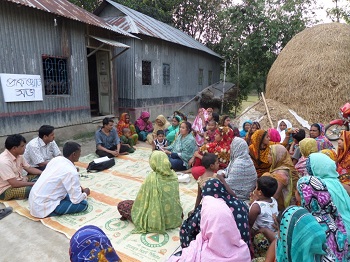Lesson Learned: The grantee presented data, which demonstrated an increasing presence of women advocating gender- and youth-specific concerns in the Ward Shavas. There is also quantitative and qualitative evidence of enhanced local government accountability and service delivery. In addition, volunteer animators, civil society group representatives and self-help group members, with whom evaluators have met, continue to mobilise local community members to participate in local governance, and to hold local decision makers accountable. Interaction among local Bangladesh government, Union Parishad representatives, and all segments of the local population worked and changed the way in which local governments make their annual budget planning choices.
